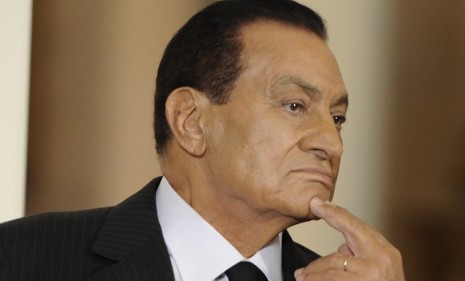Is prosecuting Mubarak a mistake?
Egypt's former president is being held accountable for the alleged crimes of his regime. Is that what's best for Egypt — and the world?

A free daily email with the biggest news stories of the day – and the best features from TheWeek.com
You are now subscribed
Your newsletter sign-up was successful
Egypt is investigating ousted President Hosni Mubarak for alleged corruption and human rights abuses, including the deaths of 846 protesters in the attempt by security forces to crush anti-government demonstrations earlier this year. Mubarak, who stepped down Feb. 11, remains hospitalized after a mild heart attack, but the legal preparations are moving ahead quickly. But will Mubarak's trial be a necessary step toward reform, or will it only make it harder to get other stubborn rulers to surrender power?
Making an example of Mubarak will backfire: Whatever the Egyptian people think of Mubarak's rule, says Stephen M. Walt in Foreign Policy, he left power "more-or-less peacefully," and didn't "unleash massive force against anti-government demonstrators" the way Moammar Gadhafi has in Libya. Yet the U.S. is trying to find someone to offer Gadhafi a cushy exile, while Mubarak "winds up in jail (maybe deservedly)." The obvious lesson for future dictators "is 'No more Mr. Nice Guy,' which may not be the message we really want to be sending."
"A tale of two despots: Mubarak gets jail; Gadhafi gets a pass?"
The Week
Escape your echo chamber. Get the facts behind the news, plus analysis from multiple perspectives.

Sign up for The Week's Free Newsletters
From our morning news briefing to a weekly Good News Newsletter, get the best of The Week delivered directly to your inbox.
From our morning news briefing to a weekly Good News Newsletter, get the best of The Week delivered directly to your inbox.
Looking the other way would be worse: There's no guarantee Mubarak will get real justice, says Abigail Hauslohner in TIME. His connections in Egypt's weak judicial system could get him and his family off easy, or "the military to set up kangaroo courts and sentence certain officials to appease the mob." But holding to account "a formerly untouchable class of wealthy and powerful politicians" is a necessary first step toward building a "post-revolutionary" Egypt where people will trust their government.
"Egyptian Justice: What to Do About the Mubaraks?"
Focusing too much on the past is dangerous: It's no surprise that Egypt's ruling generals and the leaders of the protests have been so "busy dismantling the former regime," says Hamza Hendawi for the Associated Press. "But not enough is being done to deal with issues that, if left unresolved, could pose a serious threat to the country's future." Islamic militants are on the rise, and senior members of the Muslim Brotherhood are talking about "installing an Islamic state." That's the real threat to Egypt's "transition to democracy."
"Analysis: Egypt new rulers too busy with the past"
A free daily email with the biggest news stories of the day – and the best features from TheWeek.com
-
 AI surgical tools might be injuring patients
AI surgical tools might be injuring patientsUnder the Radar More than 1,300 AI-assisted medical devices have FDA approval
-
 9 products to jazz up your letters and cards
9 products to jazz up your letters and cardsThe Week Recommends Get the write stuff
-
 ‘Zero trimester’ influencers believe a healthy pregnancy is a choice
‘Zero trimester’ influencers believe a healthy pregnancy is a choiceThe Explainer Is prepping during the preconception period the answer for hopeful couples?